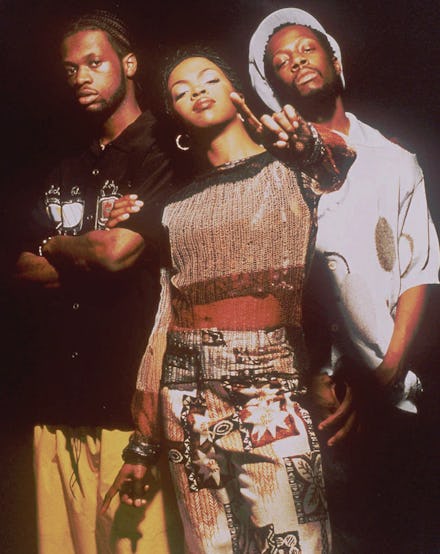20 Years Ago, Lauryn Hill and the Fugees Changed the Future of Hip-hop with 'The Score'

Unlike many household names in music, Ms. Lauryn Hill's artistry cannot be summed up with a single talent. Her songwriting is uncompromisingly honest, to the point of being brutally so. Her voice is expressive, tearjerking at times, transcendent at others, with little space in between. And she can rip a mic in a way few other MCs can.
That last talent is the one that first earned her audience, yet it's the skill most people overlook when they discuss the tragically short but sweet time she spent in the spotlight. There's no finer example of her lyrical abilities than The Score by the Fugees, released 20 years ago Saturday.
Of course, Lauryn Hill was one of a trio, aided and abetted by the patois-spitting Wyclef Jean and the bullish Pras. Each of them brought some serious bars to the table, and the dynamic between still gives The Score an elastic unpredictability that wouldn't have worked if it was any of the rappers' solo projects. But Lauryn Hill runs an absolute lyrical clinic on the album, dropping at a time when hip-hop needed it the most.
1996 was a rough year for hip-hop, though in early February the world had no idea how bad it would get.
Mr. Cee of the San Francisco group RBL Posse was killed in January, setting off a media frenzy equating hip-hop with violence. That narrative reached its head in September, when Tupac Shakur would record some of his greatest music and meet the bullet that would end his life. The Score turned an extremely critical eye on this gangster culture that was beginning to fully eclipse hip-hop.
The album's spoken word intro laughs in the faces of young bucks trying to be "Corleone, Luigi/ Or Gambino or Gotti or whatever the fuck." The first raps out of the gate continue that line. "I get mad frustrated when I rhyme," raps Hill on "How Many Mics." "Thinkin' of all the kids that try to do this for all the wrong reasons."
The album goes on to dissect what those reasons are: a misguided thirst for fame, a shortcut to riches, a way to ensure one's street cred. Hill and Jean run circles around these rappers whose eyes remain fixed on the bottom line. The lyrics smash together high and lowbrow nods to figures like al Hajj Malik Shabazz (Malcolm X), Batman and Bill Clinton, often within single tracks. It creates a patchwork quality that offers endlessly entertaining replay value.
Hill once called it "an audio film," according to NME. "It's like how radio was back in the 1940s. It tells a story, and there are cuts and breaks in the music. It's almost like a hip-hop version of Tommy, like what The Who did for rock music." In a 1996 MTV interview, Jean expanded on that, explaining the name as a nod to a film score. "But also in the sense of settling the score for those who slept on the Fugees," he added. "It's the big payback."
Source: MTV
In many ways the album was a do-or-die moment for the group. Their previous effort had flopped critically and commercially, and there was a lot riding on this album to get right. But the group felt none of this pressure.
"It was done calmly, almost unconsciously," Jean once said of the recording process, according to Hot New Hip-hop. "There wasn't any pressure — it was like 'let's make some music,' and it just started forming into something amazing. It sounded like a feel-good hip hop record to us, and it was different than what anyone was doing at the time. It was three kids from an urban background expressing themselves."
Unfortunately, however, things could not stay rosy. Tensions between group members are sewn throughout the album. "If you read the magazine, it says the girl should've went solo," Jean raps on "Zealots," calling out critics that fixated on the idea of Hill leaving the group. "The guys should stop rapping, vanish like Menudo."
Hill parried those critiques for a long time, but when her relationship with Jean began to sour, she did go solo. The album she created, The Miseducation of Lauryn Hill, was so perfect it nearly ruined her life. She never would have gotten the platform to do so had Jean and Pras not helped bring such lyrical fire out of her on their early albums.
"I got my first stage experiences and a lot of my confidence from what I learned in the studio with these guys, Wyclef especially," Hill said in an Essence interview around the time of The Score's 10 year anniversary. "We had the complications of becoming public people at a very young age, and all of it happened under a microscope."
Though the Fugees could not last, The Score has. It broke the floodgates for the Chance the Rappers and Pharrells of the world who look to meld pop songwriting sensibilities with politically-incisive lyricism.
The tropical, R&B-tinged hip-hop the group crafted on songs like "Killing Me Softly" and "Fu-Gee-La" is arguably more popular and present on the radio today than classic sounds of All Eyez on Me and Reasonable Doubt, which are also turn 20 this year. But in and of itself, The Score still offers a haven for all those fans seeking refugee from so many of hip-hop's distractions: the aimless beefs and self-aggrandizing drops that rarely amount to anything of true importance.